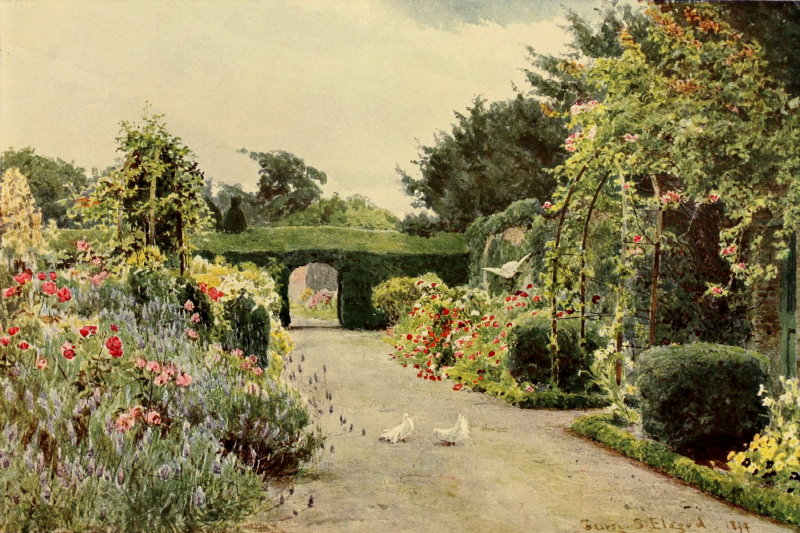| Web
and Book design,
Copyright, Kellscraft Studio 1999-2021 (Return to Web Text-ures) |
 (HOME)
|
|
PALMERSTOWN The
Earl of Mayo's residence in County Kildare, Ireland, lies a few miles distant
from the small market town of Naas. The house is of classical design, built
within the nineteenth century. Around it is extensive park-land that is
pleasantly undulating, and is well furnished with handsome trees both grouped
and standing singly. In the lower level is a large pool with Water-lilies, and
natural banks fringed with reeds and the other handsome sub-aquatic vegetation
that occurs wild in such places. There
was an older house at Palmerstown in former days, whose large walled kitchen
garden remains. It is a lengthy parallelogram, divided in the middle into two
portions, each nearly a square, by a fine old yew hedge with arches cut in it
for the two walks that pass through. The paths are broad, and some width on
each side has been planted as a flower border, giving ample space for the good
cultivation and enjoyment of all the best of the hardy flowers, so willing to
show their full growth and beauty in the soft genial climate of the sister
island. It is
a place that shows at once the happy effect of wise and sure direction, for
Lady Mayo is an accomplished gardener, and the inclosure abounds with evidences
of fine taste and thoughtful intention. One length of border is given to
Lavender and China Rose, always a delightful and most harmonious mixture. There
is a length of some twenty yards of this pleasant combination — the picture
shows one end — with a few groups of taller plants, such as Bocconia, behind.
Fruit-trees, trained as espaliers, form the back of the border, or sometimes
there is a hedge of Sweet Pea. Vegetables occupy the middle portions of the
quarters. The flower-bordered paths pass across and across the middle space,
with others about ten feet within the walls and parallel with them. Quite in
the middle the path passes round a fountain basin, and there are four arches on
which Roses and Clematis are trained. Such
flower borders give ample opportunity for the practising of good gardening. The
task is the easier in that only one of the pairs of borders can be seen at a
glance, and a definite scheme of colour progression can easily be arranged.
Such schemes are well worth thinking out. The writer's own experience favours a
plan in which the borders begin with tender colourings of pale blue, white and
pale yellow, with bluish foliage, passing on to the stronger yellows. These
lead to orange, scarlet and strong blood-reds. The scale of colouring then
returns gradually to the pale and cool colours. It is
by such simple means that the richest effects of colour are obtained, whether
in a continuous border or in clump-shaped masses. A separate space of
flower-border may also be well treated by the use of an even more restricted
scheme of colouring. Purple and lilac flowers, with others of pink and white
only, and foliage of grey and silvery quality, the darkest being such as that
of Rosemary and Echinops, make a charming flower-picture, with a degree of
pictorial value that any one who had not seen it worked out would scarcely
think possible. The
right choice of treatment depends in great measure on the environment. When
this, as at Palmerstown, consists of old walls and a grand hedge of venerable
yews, a suitable frame is ready for the display of almost any kind of
garden-picture. The
yews are ten feet high and six feet through. Over a seat one of them is cut
into the form of a peacock. To the left of the green archway in the Lavender
picture, the yew takes the form of the heraldic wild-cat, the Mayo crest.
Outside the garden is a yew walk of untrimmed trees; they show in the picture
to the right, over the wall. Here, in the heat of summer, the coolness and dim
light are not only in themselves restful and delightful, but, after passing
along the bright borders, where eye and brain become satiated with the
brilliancy of light and colour, the cool retreat is doubly welcome, preparing
them afresh for further appreciation of the flower-borders.  CHINA ROSES AND LAVENDER, PALMERSTOWN From the picture in the possession of Mrs. Kennedy-Erskine |